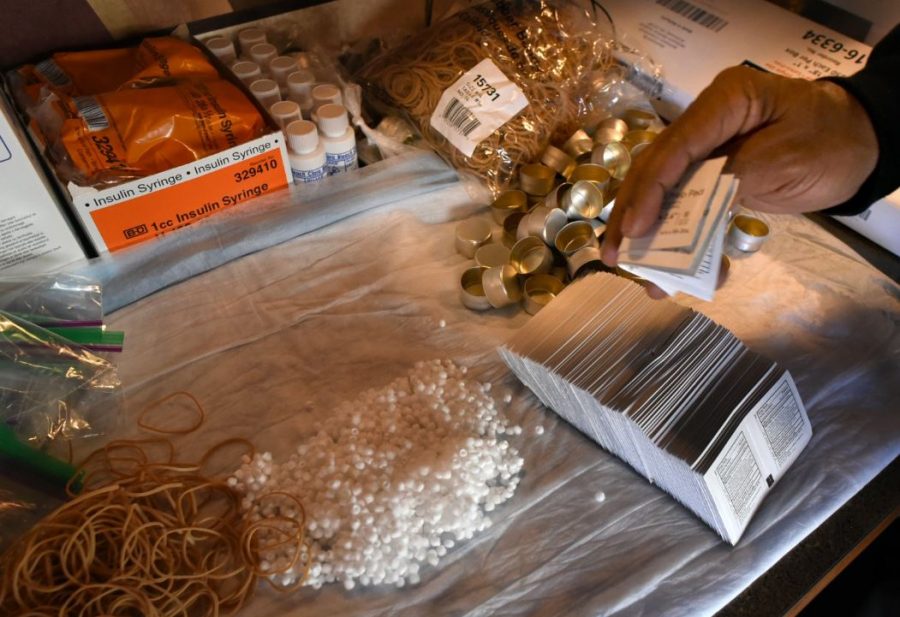Q and A: Matthew McMurry Assistant Professor of Psychology, Miami University
After escalating to new heights, Cincinnati becomes the city with the most heroin overdoses in America. Matthew McMurry, Assistant Professor of Psychology at Miami University, studies the psychological and cognitive effects of addiction on the brain. From a scientific perspective, the complexity of heroin addiction helps civilians better understand the depths of this dilemma. Photo Courtesy of MCT Campus
November 7, 2016
Q: What interested you in the topic of addiction in adolescence?
A: There are two parts to this question: 1) What interested me in addiction? and 2) What interested me in adolescence? First, I got interested in addiction during my undergraduate coursework in psychology. We learned that addiction is the only entirely preventable psychiatric illness. If you don’t ever use drugs, you can’t ever become an addict. This naturally made me wonder why individuals choose to use drugs, and what factors might predispose an individual to transition from casual drug use (recreational) to a full blown dependence. Is it their genetics, presence of other mental health disorders, family environment, etc? So, I began researching these questions during graduate school. As for the adolescence aspect of my research, this focus stemmed from the fact that almost everyone who uses drugs started using them in adolescence (which neurobiologically extends through college). Since people start using drugs during this period, this means that addiction begins then too. To prevent addiction, we thus must understand the intricacies of the adolescent brain and how it processes drugs and their associated stimuli.
Q: What was the most surprising discovery or conclusion from your research?
A: One of the most surprising findings of my research is that alcohol abuse during adolescence actually changes the way your brain develops. It fundamentally changes who you are and what you choose to do, subtly predisposing you to make riskier decisions in other aspects of your life (money, relationships, etc), and perhaps leading you to continue to abuse drugs. This vicious feedback cycle begins early in life, with the choice to abuse the drug, but resonates throughout the rest of your life without your conscious knowledge. Beginning abuse in adulthood doesn’t seem to have the same effects, possibly because your brain has finished developing. I find the presence of this “sensitive period” fascinating.
Q: How does the addiction cycle work in adolescence?
A: The addiction cycle works pretty much the same in adolescence as it does in adults. The abuser must transition from recreational use to dependence, then attempt to quit, but eventually relapse. The addict then typically attempts to quit, but often relapses again. This cycle persists throughout the rest of the person’s life. While the fundamental stages are the same across age groups, keep in mind that abuse during adolescence changes the trajectory of your brain’s development, likely making it easier for you to fall down this path.
Q: How has your research in rats been applicable to understanding human behavior?
A: Drugs work the same way in all species. The major benefit of using animals is that we better isolate individual variables in our research. Animals allow us much tighter controls on genetic history, rearing environment, presence of other psychiatric disorders, etc. These are important aspects of the development of addiction in humans, and understanding the role each element plays requires the use of animal subjects. Animals also allow us to use more invasive procedures than would be possible in humans subjects. For example, many of the biological research techniques my lab uses would not be possible in humans. Additionally, considering the results I described in my earlier response above, it would not be ethical for me to bring a bunch of six year olds into the lab and get them drunk, but I can do this with animal subjects. So the information we garner from our animal subjects can help us understand both the biological and environmental factors that contribute to addiction. On a related note, the use of animals in research is heavily regulated by federal, state, and institutional policy. It is not easy to gain approval to use animals and the animal’s welfare is the top priority in gaining that approval.
Q: How does addiction to drugs happen and how does it change your brain?
A: Boy, this is a tough question to answer concisely. I teach entire courses on this for juniors and seniors. I’m actually going to direct you to another resource: https://www.drugabuse.gov/publications/drugfacts/understanding-drug-use-addiction.
This is an online publication put forth by the National Institute on Drug Abuse. They’re the branch of the National Institutes for Health that focuses on addiction. There are a ton of resources on the NIDA website that may be helpful to your article. I suggest you spend a little time digging through their publications. Many of them are written for a general audience, and will undoubtedly be helpful. You can even sort by audience and topic to help you narrow your search.
Q: What defines drug use versus addiction?
A: This is another tough question. Clinically, psychiatrists use a manual called the Diagnostic and Statistical Manual of Mental Disorders (DSM), which lays out a bunch of different criteria. Again, I’m going to refer you to a NIDA publication, which very eloquently addresses your question: https://www.drugabuse.gov/publications/media-guide/science-drug-abuse-addiction-basics.
Q: What does an overdose do to the brain?
A: Neurobiologically, if drug doses are high enough, parts of your brain can actually reach toxic levels of drugs, and the cells in those regions can die, much like what occurs in a stroke or traumatic brain injury. While overdoses can have a strong impact on the brain, when individuals die from an overdose, this is typically due to cardiac side effects of the drug, not its neurobiological effects. All drugs travel through your circulatory systemand thus reach all parts of your body. Therefore, every drug has “side” effects. These side effects can be deadly if enough drug is taken, with heart attacks and respiratory suppression being the most common. This is typically what happens in heroin overdoses.
Q: What the best treatment to addiction and can it ever be treated?
A: Addiction is a life-long disease. There is no “cure.” There is also no “best treatment.” Instead, the best course of therapy is catered to the individual patient, based on their needs and their resources. Typically, treatment involves medications, group and individual therapy, and support groups like Alcoholics Anonymous. Often, individuals will also start this treatment at a rehabilitation center after an especially bad bout of drug use. Regardless of any immediate success with these treatments, addicts will always be at risk of relapse, and many will seek treatment for the disease for the rest of their life.





![Mock Trial members from Gold and Green team last year pose for a picture in front of the OCLRE building in Columbus. "We all put in so much work [last] year. I know [this] year we’ll come back improved and ready to win!” said Ogunbodede.](https://shsleaf.org/wp-content/uploads/2025/10/IMG_4121-300x205.jpg)

